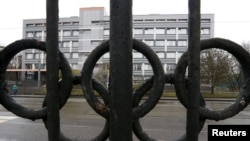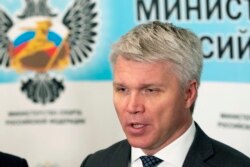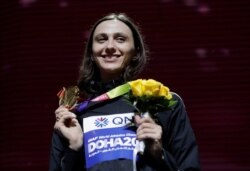Top Russian officials decried the recommendations by a World Anti-Doping Agency committee to suspend Russia from international competition over tainted athlete doping probes — the latest in a drawn out saga over accusations of Russian state sponsored doping that has roiled global sport since 2014.
Russian athletes, unsurprisingly, joined in expressing bitterness about the WADA recommendations. But while some argued the suggested WADA penalties were unduly harsh, others blamed a failure in Russian sport leadership for risking their chance to compete in the next two Olympic Games and perhaps beyond.
The recommendations, issued by WADA’s Compliance Review Committee on Monday, alleged evidence of tampering of some 2000 athlete probes at Moscow's RUSADA testing facility, and called for a four-year suspension of Russia from international competition, including the Olympic Games.
Reacting to the pronouncement at a news conference on Tuesday, Russia Minister of Sport Pavel Kolobkov noted the WADA commission recommendations were not final — and insisted the body's investigators had failed thus far to take into account explanations by Russian experts.
“The Russian side honestly fulfilled its obligations. We provided all necessary information,” said Kolobkov. Russian Foreign Minister Sergey Lavrov also weighed in on the issue — cautioning that western media was often too quick to judge when it came to Russia.
The charges, argued Lavrov, were carried out by those who “wish to show Russia as guilty in anything and everything.”
The Kremlin was more sanguine. A spokesman merely noted that President Vladimir Putin — who has gladly cast Russia’s return to sporting glory as a symbol of the country’s rising global status under his 19-year rule — had no plans to meet with government sporting officials over the issue.
WADA is expected to make a final decision regarding the committee’s recommendations on December 9. Whatever the outcome, Russia would have a right to appeal to the Court of Arbitration for Sport for a final ruling.
Athletes react
Yet athlete anger was also palpable — with leading athletes lashing out at both WADA and Russia’s sporting bureaucracy for failing to lift a doping cloud that has hung over Russian athletics ever since a 2015 WADA investigation detailed widespread cheating at international events.
Indeed, just days prior to this week’s WADA committee recommendations, World Athletics, the sport’s global governing body formally known as the IAAF, provisionally suspended top figures from Russia’s Track and Field for helping champion Russian high jumper Danil Lysenko avoid doping tests earlier this year.
The charges prompted the immediate full suspension of efforts to reinstatement Russia's track and field association following its 2015 suspension. Until the most recent violation, the talks reportedly had been making headway.
In a letter addressed to Russia’s Minister of Sport and head of Russia’s Olympic Committee, acclaimed high jumper Maria Lasitskene made it clear she was growing tired waiting for officials to repair the damage.
“The new team, whose goal was to pull out of this doping nightmare, proved no better than the old one,” wrote Lasitskene in an open letter posted to her Instagram account.
She went on to describe herself and other athletes “in agony.” “We’ve already lost 4 years,” wrote Lasitskene. “Clean athletes are still defenseless and uncertain whether they’ll be given the chance to compete tomorrow.
While Russia has acknowledged problems with doping to a degree, it has also argued the country is being unfairly singled out — with Russian athletes being punished en masse for the sins of a few.
In turn, the International Olympic Committee made allowances for Russian athletes who undergo additional drug screening to compete as neutral athletes, without state uniform or flag or anthem, at the 2016 and 2018 Olympics.
In a statement released Tuesday, the IOC criticized Russia over the doping probe manipulations while suggesting bad actors at RUSADA had sabotaged what it otherwise saw as a good faith effort by Russian Olympic Officials.
"The report does not indicate any wrongdoing by the sports movement in this regard, in particular the Russian Olympic Committee or its members,” noted the IOC statement.
“In this context, the IOC welcomes the opportunity offered by WADA to Russian athletes to compete, “where they are able to demonstrate that they are not implicated in any way by the non-compliance."
Yet some Russians — including leading sporting legends — expressed exasperation over the Russian government’s continued inability to weed out drug offenders and make peace with WADA.
“The fact that there are more honest and clean athletes in our country than lying and irresponsible ones is a fact,” wrote Yelena Isinbayaeva, the former two-time Gold medal winner.
“So why is it that we still can’t seem to separate these two groups — the honest from the deceitful?”
Access of the Moscow RUSADA laboratory doping probes was one of two key condition to WADA’s so-called “roadmap to return” to international competition.
Yet from President Putin on down, Russian officials have been loathe to meet WADA’s other supposed requirement: that Russia admit it engaged in a massive doping effort with support from the government and security services to help secure medals — most notably at the Russia-hosted Sochi 2014 Winter Games, in which Russia placed first among nations.
Russian officials and, to a degree athletes, argue geopolitics have helped hype the hysteria around Russian doping — with sport long ago joining Ukraine, Syria, election interference, and a myriad of other issues that currently infect Russian relations with the West.
Given the political stakes involved, observers puzzled out possible motives behind the latest manipulation of athlete probes at the Moscow lab — with the popular sports.ru website coming to what it admitted was an uncomfortable conclusion: someone in the Russian government had chosen to gamble the Olympic dreams of young Russian athletes rather than admit past doping transgressions.
“We don’t have sport in a traditional sense — in Russia, it long ago became a special-operation for winning medals,” said the editorial.
“Our manipulation of the database — is, by fact, an admission. It’s proof of a government doping system.”








